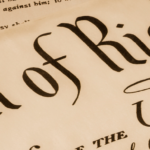Religion’s Complex Role in Crime
Faith and the Scales of Justice – Does religion attract or deter crime?

Religion and Crime
Religion has been a cornerstone of human society for millennia, shaping cultures, morals, and legal systems. Its influence also extends to the realm of criminal justice, raising fascinating questions about the interplay between faith and crime. At LEWIS & DICKSTEIN, P.L.L.C., we understand the importance of considering all aspects of a case, and religion can sometimes be a significant factor. Understanding the complex relationship between faith and the scales of justice is essential.
Faith and Scales of Justice – Does Religion Deter Crime?
The relationship between religion and crime rates is complex and hotly debated. Some studies suggest a correlation between religiosity and lower crime rates. The theory posits that religious teachings promote moral behavior, discourage violence, and offer a sense of purpose that reduces the allure of criminal activity. Additionally, religious communities often provide social support networks that foster positive values and discourage deviant behavior.
However, other studies show no clear link between religion and crime. Sociologists argue that other factors, like poverty, education, and social inequality, play a more significant role in crime rates. Additionally, some interpretations of religious texts can be used to justify violence or intolerance, potentially leading to crime.

Religion and Rehabilitation
While the deterrent effect of religion on crime is debatable, its role in rehabilitation is more widely recognized. Religious programs within prisons can offer inmates a sense of hope, purpose, and a path to redemption. They can also provide moral guidance, anger management skills, and a support network that eases the transition back to society. Studies suggest faith-based programs can reduce recidivism rates, leading to a safer society.
Religious Freedom, Faith and the Scales of Justice
The right to practice one’s faith freely is a cornerstone of a just society. However, this right can sometimes clash with the demands of the criminal justice system. Here are some potential conflicts:
- Dietary restrictions: Religious dietary restrictions can create challenges in prison settings where meals are standardized.
- Religious attire: Some religions mandate specific clothing. Balancing religious freedom with security concerns within correctional facilities can be complex.
- Religious practices: Certain religious practices might be seen as disruptive or pose safety hazards in prison environments.
When representing clients, we strive to ensure their religious freedom is respected while upholding the rules and regulations of the justice system. We advocate for reasonable accommodations that allow them to practice their faith without compromising safety or security.

Religion and Sentencing In Relation to Faith and the Scales of Justice
Religious beliefs can sometimes influence sentencing decisions. Judges may consider a defendant’s remorse, expressions of faith, and willingness to participate in religious rehabilitation programs when determining appropriate punishment.
The Importance of Context
Religion is deeply personal, and its expression can vary widely between individuals and denominations. We gather information about a client’s religious beliefs and practices when working on a case. This context allows us to:
- Identify potential conflicts: We can anticipate and address potential clashes between a client’s faith and the legal system.
- Explore rehabilitation opportunities: Can faith-based programs offer a path forward for a client?
- Advocate for religious freedom: We strive to ensure a client’s religious needs are respected while their case progresses.

Don’t Let Your Faith Become an Obstacle in the Legal System: How We Can Help
Religion is a powerful force that can influence human behavior and societal norms. It’s a complex and multifaceted issue when considering crime and criminal justice. At LEWIS & DICKSTEIN, P.L.L.C., we recognize the importance of religion in our clients’ lives and work to ensure their faith is considered throughout the legal process.
Call us today at (248) 263-6800 for a free consultation or complete an online Request for Assistance Form. We will contact you promptly and find a way to help you.













